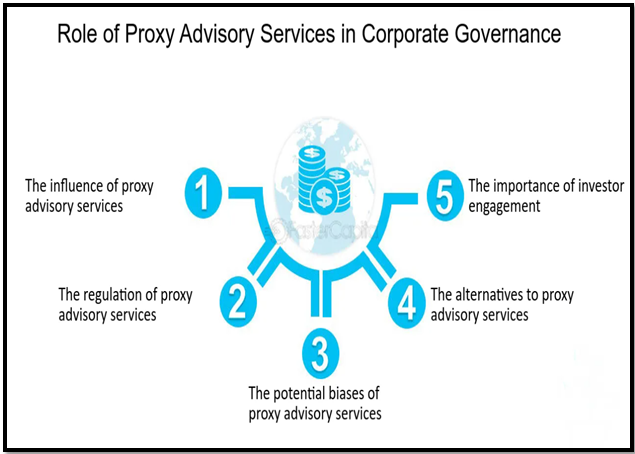AT ARM’S LENGTH, FOR CORPORATE HEALTH
SYLLABUS:
GS 3:
- Indian Economy and issues relating to planning, mobilization, of resources, growth, development and employment.
Focus:
- Proxy advisors attract attention when their recommendations lead to rejection of resolutions like in the case of Nestle’s royalty payout
Source: Reddit
Proxy advisory firms position themselves as independent entities that offer guidance to individual shareholders, minority shareholders, or institutional investors concerning the proper utilisation of their rights within a company.
Objectivity in Recommendations:
- Proxy advisors attract attention when their recommendations lead to significant decisions, such as the rejection of Nestle’s royalty payout.
- Divergence in views among proxy advisors is common, exemplified by the ITC Hotels demerger.
- Rarely do proxy advisors unanimously agree, with exceptions like the ICICI Securities delisting and Tata Motors DVR proposals.
- The influence of proxy advisors varies globally, with limited power in India compared to other countries.
- Stakeholders Empowerment Services (SES) recommended against 1,841 resolutions in 2023-24, but only 55 were rejected.
Support System for Investors:
- Institutional investors in India conduct their own analysis, using proxy advisors as supplementary support.
- Proxy advisors serve as a support system for informed decision-making rather than being decision-makers.
- They often criticize and find faults, akin to a doctor diagnosing issues.
- PAs should be treated as doctors for good governance, offering corrective insights.
- The right approach is for investors to make their own informed decisions with the help of proxy advisors.
Interpretation of Laws and Governance
Interpretation Differences:
- Problems arise when proxy advisors and companies interpret laws differently.
- Proxy advisors create their own benchmarks, leading to conflicts between regulatory compliance and governance.
- Governance is seen as a higher form of compliance, encompassing spirit and letter of the law.
- Proxy advisors should not second-guess management decisions if they adhere to governance parameters.
- They lack the expertise and information that boards have to determine the best course for a company.
Drafting of Meeting Notices:
- The drafting of meeting notices is crucial to ensure proposals are well-supported with specific rationale.
- Proper disclosures and rationale are necessary for informed decision-making.
- Most negative recommendations arise from inadequate disclosures.
- Controversial issues often relate to valuation concerns.
- Proxy advisors have a fiduciary responsibility to raise concerns about unfair valuations.
Valuation Issues
Valuation Controversies:
- Proxy advisors are not experts in valuation but must address unfair valuations.
- Valuation is often considered an art rather than an exact science.
- Discrepancies in valuations raise questions about the accuracy of the “valuation is an art” claim.
- SES relies on independent valuations, especially for deals between listed entities.
- The market price is viewed as the fairest estimation of value.
Recent Case Studies:
- Tata Motors and ICICI Securities faced noteworthy issues with proxy advisors.
- In both cases, a minority of investors raised opposition despite majority institutional support.
- The ICICI Securities case involved concerns about valuation based on current vs. listing price and the chosen regulatory route.
- The NCLT scheme route was chosen transparently, involving greater scrutiny.
- Tata Motors faced unique opposition from an individual investor advocating for an exchange ratio that ignored market price differences.
Challenges and Expectations
Managing Expectations:
- It is impossible to satisfy all stakeholders’ expectations.
- The ICICI proposal satisfied most proxy advisors and institutional investors, despite some opposition.
- Proxy advisors’ recommendations are not binding, and they cannot cry foul if their advice is not followed.
- Legal and logical arguments must support reasonable expectations.
- Any legally available route, if fair and not benefiting select individuals, can be chosen.
Unique Case of Tata Motors:
- An individual investor’s campaign claimed Tata Motors DVR shareholders were treated unfairly.
- The exchange ratio demand ignored a decade-long market price difference.
- An economic valuation concept was used to argue Tata Sons were unfairly benefiting.
- Proxy advisors must remain grounded in factual and legal realities.
- The law must stay practical and cannot support imaginative flights of fancy.
Evolution and Independence of Proxy Advisors
Maturity of the Industry:
- The proxy advisory industry has matured over more than a decade.
- Initial struggles have given way to established practices and recognition.
- The current challenge is to maintain independence and freedom from conflicts of interest.
- Proxy advisors must continue their work without worrying about outcomes.
- They are not beneficiaries of the outcomes but serve the investors’ best interests.
Maintaining Integrity:
- Proxy advisors should focus on maintaining their objectivity and independence.
- They must avoid conflicts of interest to preserve their credibility.
- Continuous improvement and adherence to best practices are essential.
- Their role is to provide informed recommendations based on thorough analysis.
- The industry’s success lies in supporting good governance and investor decisions.
SEBI’s Proposed Code of Conduct for Proxy Advisory Firms
|
Source:The Hindu
Mains Practice Question:
Discuss the role of proxy advisors in corporate governance. How do they influence decision-making in shareholder meetings, and what challenges do they face in maintaining objectivity and independence?




